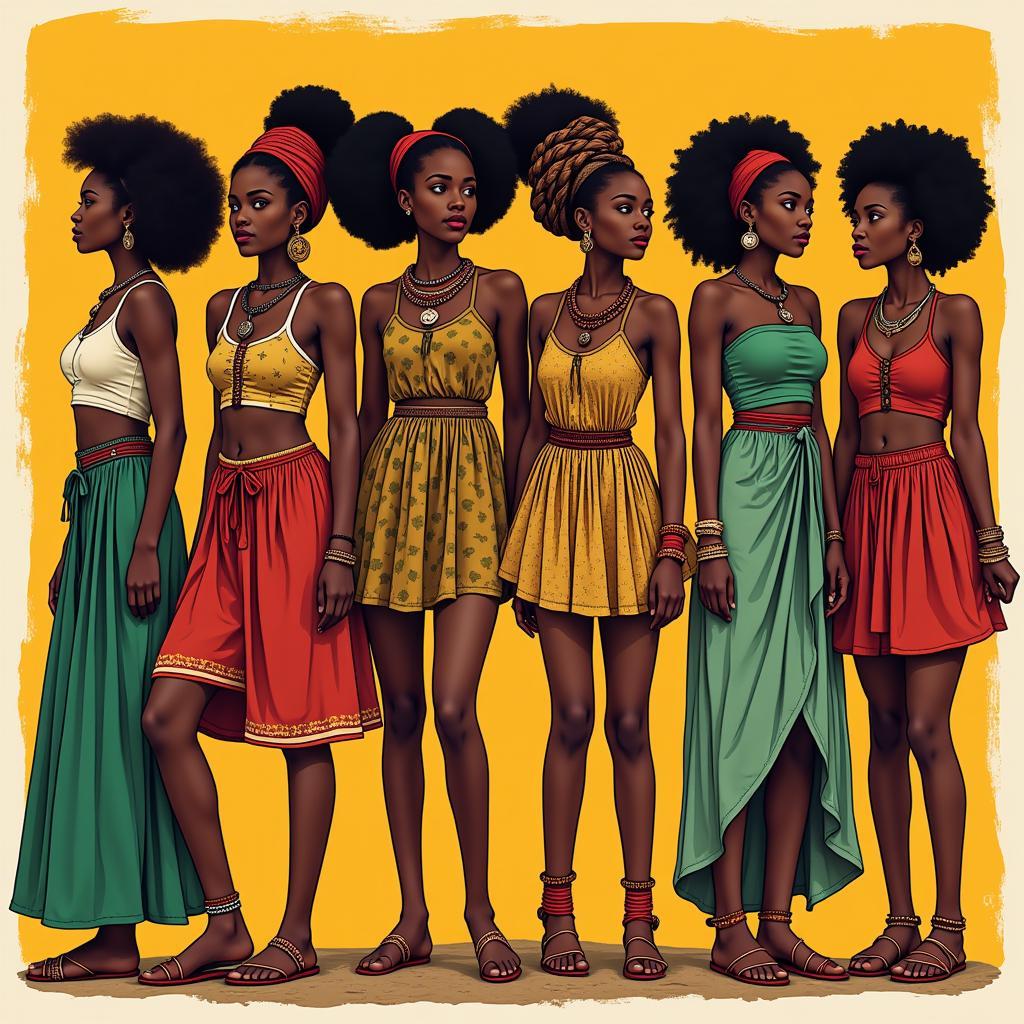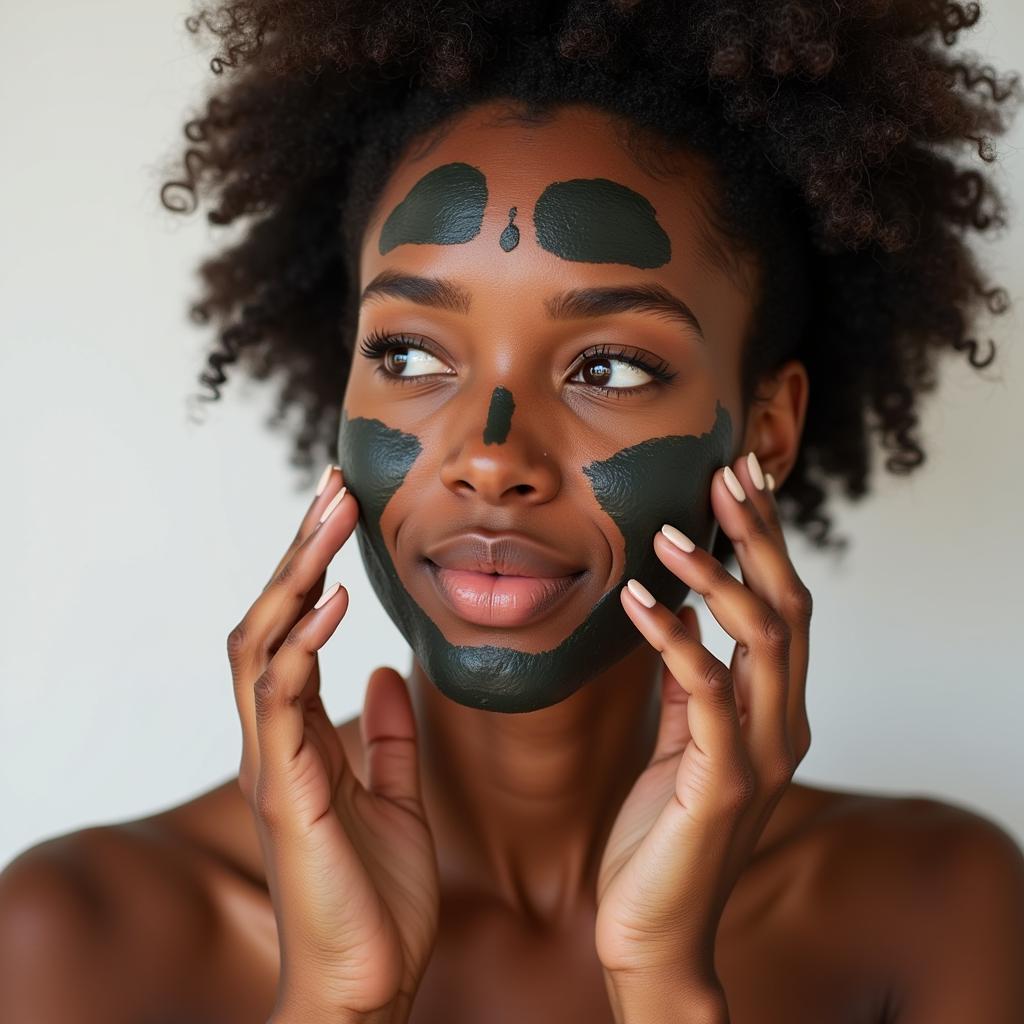Exploring the Vibrant World of African Cloth Necklaces
African Cloth Necklaces offer a captivating blend of color, texture, and cultural significance. From the bold patterns of West Africa to the intricate beadwork of the Maasai, these adornments tell stories of heritage, craftsmanship, and individual expression. This article delves into the diverse world of African cloth necklaces, exploring their history, creation process, and the cultural narratives they embody. We’ll also discuss styling tips and where to find these unique pieces.
A Rich Tapestry of Tradition: The History of African Cloth Necklaces
African cloth necklaces have a long and fascinating history, deeply intertwined with the continent’s rich textile traditions. For centuries, cloth has been more than just a material for clothing; it has served as a canvas for artistic expression, a symbol of status, and a powerful medium for storytelling. Different regions and ethnic groups have developed their own unique styles, techniques, and symbolic meanings associated with cloth necklaces. From the intricate kente cloth of Ghana, often used in ceremonial necklaces, to the vibrant indigo-dyed fabrics of Mali, each piece carries a distinct cultural imprint. The evolution of these necklaces reflects the changing social, economic, and artistic landscapes of Africa, showcasing the adaptability and creativity of its people. For instance, some early necklaces might have incorporated natural elements like bone or wood alongside cloth, while more contemporary designs might feature recycled materials or modern beading techniques.
Early African cloth necklaces were often created using locally sourced materials and traditional techniques passed down through generations. These skills included weaving, dyeing, embroidery, and beading, resulting in unique and intricate designs. The necklaces were not merely decorative; they held significant cultural meaning, often representing social status, marital status, or spiritual beliefs. Some necklaces were worn as talismans for protection or good luck, while others served as markers of identity within a specific community.
Looking at contemporary African bridal styles can sometimes offer a glimpse into how these necklaces have been incorporated into modern ceremonies and celebrations. The evolution from simple, functional pieces to elaborate, symbolic adornments demonstrates the enduring power of these necklaces in African culture.
From Fabric to Adornment: Crafting African Cloth Necklaces
The process of creating African cloth necklaces is often a labor of love, requiring skill, patience, and an eye for detail. The techniques vary depending on the region and the specific style of the necklace. Some common methods involve weaving strips of fabric together, wrapping cloth around beads or other materials, and incorporating embroidery or appliqué to create intricate designs. Natural dyes derived from plants, roots, and minerals are often used to create vibrant and long-lasting colors.
Each step in the process, from selecting the materials to the final finishing touches, is often imbued with cultural significance. The choice of colors, patterns, and embellishments can reflect specific traditions, beliefs, or stories. For example, the use of cowrie shells in some necklaces might symbolize prosperity and fertility, while certain geometric patterns could represent ancestral connections.
Do you want to explore different African jumpsuit styles that complement these beautiful necklaces? Click the link to find some inspiration.
Styling with African Cloth Necklaces: A Celebration of Individuality
African cloth necklaces offer a versatile and stylish way to express your individuality. They can be paired with a variety of outfits, from casual everyday looks to more formal ensembles. A bold, colorful necklace can add a pop of personality to a simple white t-shirt and jeans, while a more intricate design can elevate a dress or jumpsuit. Experiment with different lengths, textures, and colors to find the perfect necklace to complement your style.
Think about combining an African amber necklace with a cloth necklace for a truly unique and layered look. The contrasting textures and colors can create a stunning visual effect.
Consider the occasion and the overall aesthetic you’re aiming for. A chunky, multi-layered necklace can be a statement piece for a special occasion, while a simpler, more delicate design can be perfect for everyday wear. Don’t be afraid to mix and match different styles and experiment with layering to create a look that is uniquely you.
Where to Find Authentic African Cloth Necklaces
Finding authentic African cloth necklaces can be an exciting journey of discovery. You can explore online marketplaces specializing in handcrafted goods, connect with African artisans directly through social media, or visit local shops and boutiques that carry fair-trade products. When purchasing, it’s important to support ethical and sustainable practices, ensuring that the artisans are fairly compensated for their work.
If you are interested in other accessories, check out African bug booties to add another unique element to your style. Supporting fair trade ensures that the rich cultural heritage and artistic skills of African artisans are preserved and celebrated.
Conclusion
African cloth necklaces are more than just accessories; they are wearable works of art that embody the rich cultural heritage of Africa. From their vibrant colors and intricate designs to the stories they tell, these necklaces offer a unique way to connect with the continent’s diverse traditions and celebrate individual expression. Whether you’re drawn to the bold patterns, the intricate beadwork, or the symbolic meanings, African cloth necklaces provide a captivating glimpse into a world of creativity and cultural richness. Begin your own exploration and discover the beauty and significance of these unique adornments.
FAQ
-
What are African cloth necklaces typically made of? They are often made from a variety of fabrics, including cotton, linen, silk, and traditional woven cloths like kente. Beads, shells, wood, and other natural materials can also be incorporated.
-
How do I care for my African cloth necklace? It depends on the materials used. Generally, it’s best to store them in a cool, dry place and avoid exposing them to excessive moisture or direct sunlight.
-
Are African cloth necklaces suitable for all occasions? Absolutely! From casual outings to formal events, there’s an African cloth necklace to suit every occasion.
-
Can men wear African cloth necklaces? Yes, African cloth necklaces are worn by both men and women, often reflecting cultural or social status.
-
Where can I buy authentic African cloth necklaces online? Several online marketplaces and websites specialize in handcrafted African goods, allowing you to connect directly with artisans and support fair trade practices.
-
What is the significance of colors and patterns in African cloth necklaces? Colors and patterns often hold symbolic meanings related to specific cultures, traditions, or beliefs.
-
Can I customize an African cloth necklace? Many artisans offer custom designs, allowing you to create a unique piece that reflects your personal style and preferences.
Common Scenarios and Questions
Scenario: You’re looking for a unique gift for a friend who loves handcrafted jewelry.
Question: What type of African cloth necklace would be a thoughtful and meaningful gift?
Scenario: You’re attending a wedding and want to accessorize your outfit with a statement piece.
Question: Which African cloth necklace style would best complement my outfit and the occasion?
Scenario: You’re interested in learning more about the cultural significance of African cloth necklaces.
Question: What resources are available to research the history and symbolism of these necklaces?
Further Exploration
Explore more about African lace styles designs 2018 to get inspiration for different fabric and design combinations. You might also be interested in learning more about African beadwork or traditional textile techniques.
Contact Us
When you need help please contact us by Phone: +255768904061, Email: kaka.mag@gmail.com Or visit us at: Mbarali DC Mawindi, Kangaga, Tanzania. We have a 24/7 customer support team.



